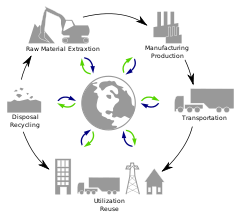- Secondary sector of the economy
-
Economic sectors Three-sector hypothesis Primary sector: raw materials
Secondary sector: manufacturing
Tertiary sector: servicesTheorists Colin Clark · Jean Fourastié Additional sectors Quaternary sector · Quinary sector Sectors by ownership Business sector · Private sector · Public sector · Voluntary sector v · production and construction. Contents
Function
This sector generally takes the output of the primary sector and manufactures finished goods. These products are then either exported or sold to domestic consumers and to places where they are suitable for use by other businesses. This sector is often divided into light industry and heavy industry. Many of these industries consume large quantities of energy and require factories and machinery to convert the raw materials into goods and products. They also produce waste materials and waste heat that may pose environmental problems or cause pollution.
. . . .
Some economists contrast wealth-producing sectors in an economy such as manufacturing with the service sector which tends to be wealth-consuming.[1] Examples of service may include retail, insurance, and government. These economists contend that an economy begins to decline as its wealth-producing sector shrinks.[2] Manufacturing is an important activity to promote economic growth and development. Nations that export manufactured products tend to generate higher marginal GDP growth, which supports higher incomes and marginal tax revenue needed to fund the quality-of-life initiatives such as health care and infrastructure in the economy. The field is an important source for engineering job opportunities. Among developed countries, it is an important source of well-paying jobs for the middle class to facilitate greater social mobility for successive generations of the economy.List of countries by Industrial output
Below is a list of countries by industrial output in 2010. Output is in millions of US$.
Rank Country Output in nominal GDP — World 19,313,147 —  European Union
European Union4,070,558 1  United States
United States3,239,374 2  China
China2,756,903 3  Japan
Japan1,359,259 4  Germany
Germany921,749 5  Brazil
Brazil560,204 6  Russia
Russia539,149 7  Italy
Italy519,944 8  United Kingdom
United Kingdom489,945 9  France
France477,767 10  Canada
Canada413,975 Rank Country Output in PPP GDP — World 22,799,316 1  China
China4,730,197 —  European Union
European Union3,792,605 2  United States
United States3,239,374 3  Japan
Japan1,073,073 4  India
India1,067,883 5  Russia
Russia818,048 6  Germany
Germany817,441 7  Brazil
Brazil582,112 8  South Korea
South Korea573,484 9  Mexico
Mexico510,995 10  Indonesia
Indonesia484,045 See also
- Manufacturing
- Three-sector hypothesis
- Industrial policy
- De-industrialization crisis
- Industry information
References
- ^ David Friedman, New America Foundation (2002-06-16).No Light at the End of the Tunnel Los Angeles Times.
- ^ Sir Keith Joseph, Center for Policy Studies (1976-04-05).Stockton Lecture, Monetarism Is Not Enough, with forward by Margaret Thatcher. (Barry Rose Pub.) Margaret Thatcher Foundation (2006).
Categories:
Wikimedia Foundation. 2010.
Look at other dictionaries:
Primary sector of the economy — The primary sector of the economy generally involves changing natural resources into primary products. Most products from this sector are considered raw materials for other industries. Major businesses in this sector include agriculture,… … Wikipedia
Tertiary sector of the economy — Economic sectors Three sector hypothesis Primary sector: raw materials Secondary sector: manuf … Wikipedia
secondary sector — noun The sector of the economy that principally uses raw materials produced by the primary sector for sale and use by other sectors … Wiktionary
secondary sector — UK US noun [S] ► ECONOMICS, PRODUCTION the part of a country s economy that manufactures goods, rather than producing raw materials → Compare PRIMARY SECTOR(Cf. ↑primary sector), TERTIARY SECTOR(Cf. ↑tertiary sector) … Financial and business terms
Economy of South Korea — The economy of South Korea is the third largest in Asia and the 13th largest in the world by GDP (PPP) as of 2007. In the aftermath of the Korean War, South Korea grew from a poor developing country to a wealthy developed country. From the mid to … Wikipedia
Economy of Wales — The Economy of Wales. In 2004, according to ONS provisional data, headline gross value added (GVA) in Wales was £39,243m, making the Welsh economy the tenth largest of the UK s twelve regions (counting Wales, Scotland and Northern Ireland… … Wikipedia
Economy of England — The Economy of England is the largest economy of the four constituent countries of the United Kingdom.England is a most highly industrialised country. It is an important producer of textiles and chemical products. Although automobiles,… … Wikipedia
Economy of Isan — The economy of Isan is dominated by agriculture, although output is poor and this sector is decreasing in importance at the expense of trade and the service sector. Most of the population is poor and badly educated. Many labourers have been… … Wikipedia
Three-sector hypothesis — The three sector hypothesis is an economic theory which divides economies into three sectors of activity: extraction of raw materials (primary), manufacturing (secondary), and services (tertiary). It was developed by Colin Clark and Jean… … Wikipedia
Economy of the Republic of Ireland — The economy of the Republic of Ireland is modern and trade dependent with growth averaging a 7% per annum in 1995 ndash;2007. Agriculture, once the most important sector, is now dwarfed by industry, which accounts for 46% of GDP, about 80% of… … Wikipedia
Share the article and excerpts
Direct link
https://en-academic.com/dic.nsf/enwiki/8712 Do a right-click on the link above
and select “Copy Link”
Secondary sector of the economy
- Secondary sector of the economy
-
Economic sectors Three-sector hypothesis Primary sector: raw materials
Secondary sector: manufacturing
Tertiary sector: servicesTheorists Colin Clark · Jean Fourastié Additional sectors Quaternary sector · Quinary sector Sectors by ownership Business sector · Private sector · Public sector · Voluntary sector

